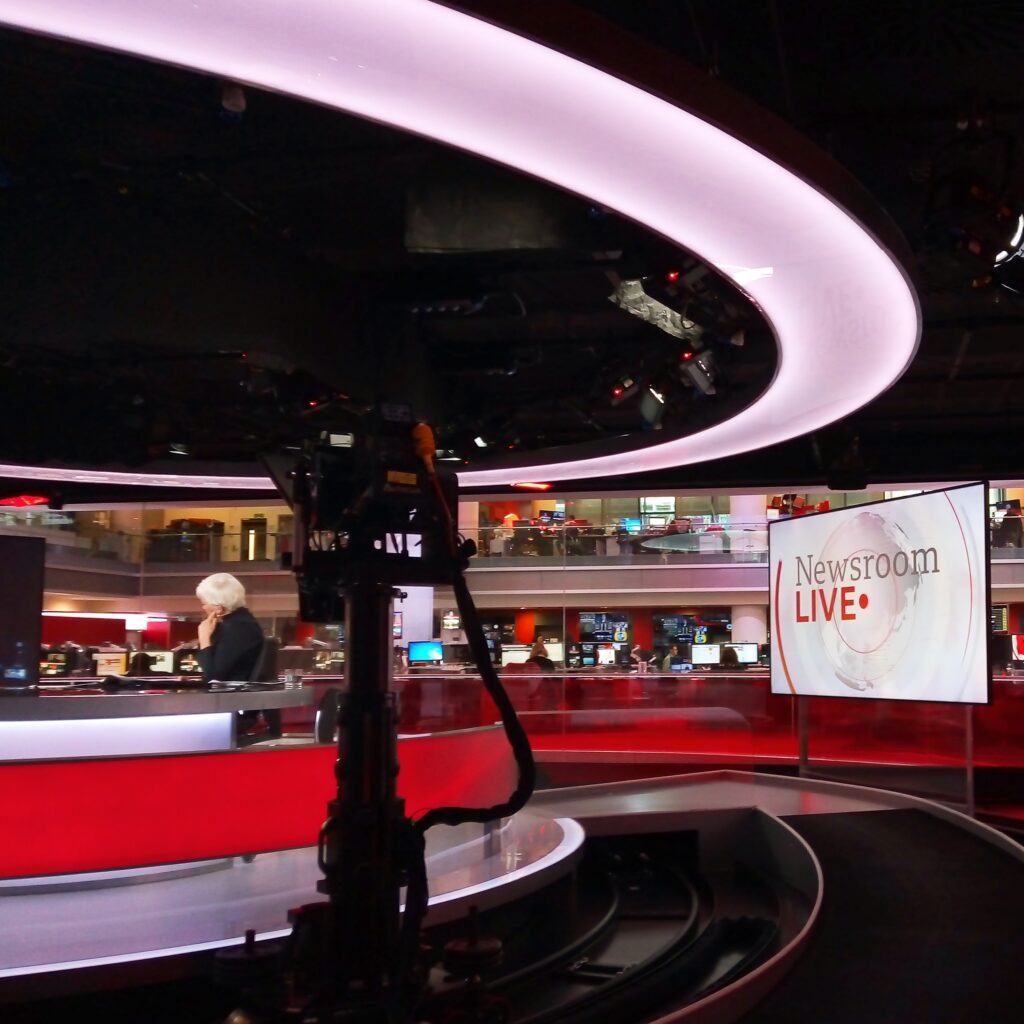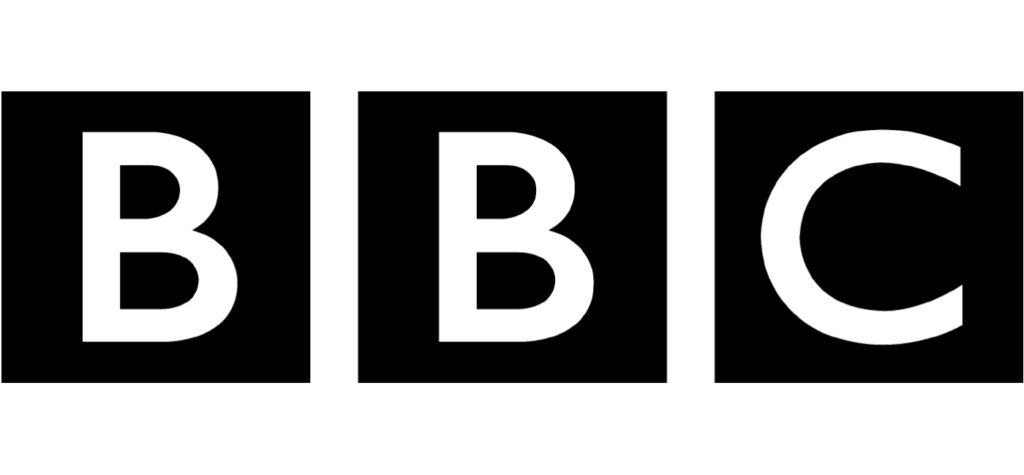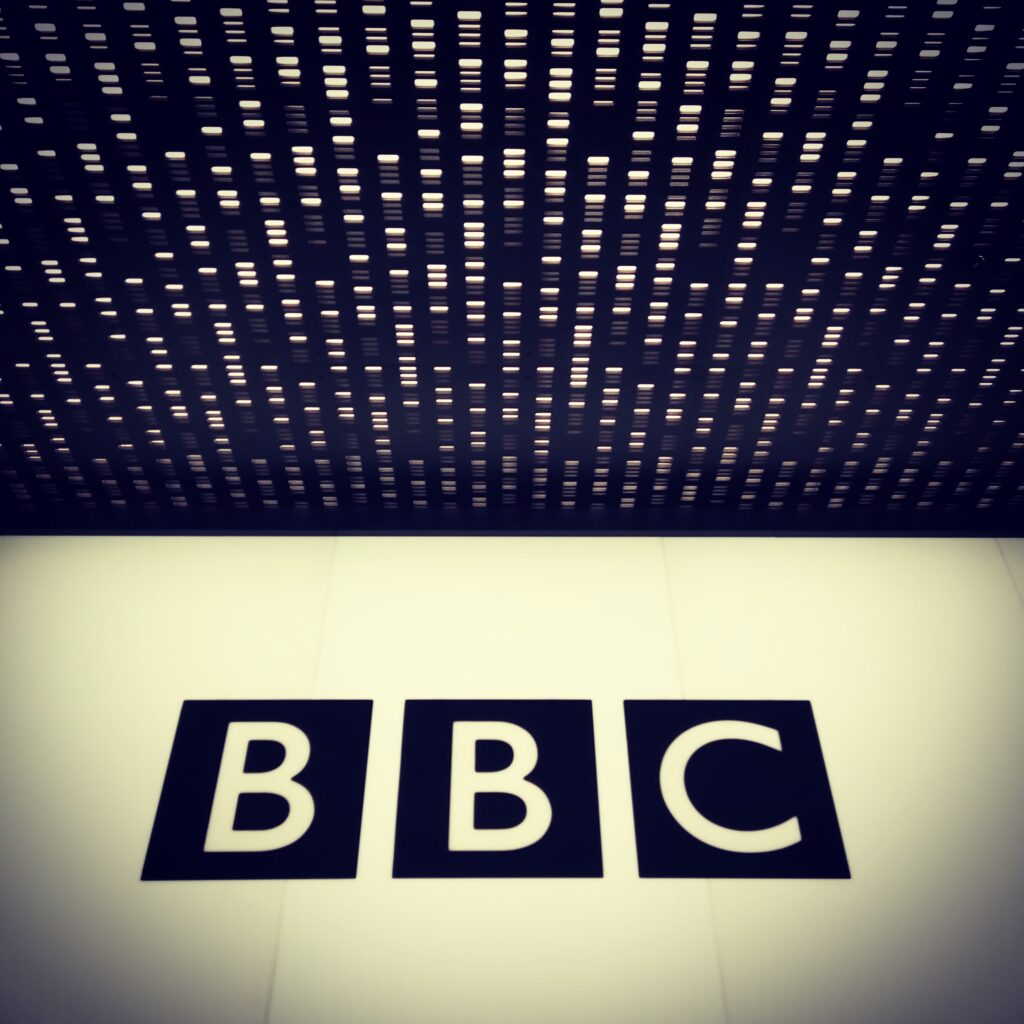
Little and Large. Autumn 1988. Studio One. That was the first time I set foot in the hallowed halls of the BBC’s Television Centre. My dad had got tickets to a Little and Large recording. It was a Sunday night and I was thirteen. The night’s recording was okay at best. Sid Little fluffed some lines and I was mesmerized by how shiny the set was. Actually, it was only the off-screen machinations that I can only remember now – those Dalek sized cameras all emblazoned with a faded italicized “BBC” and the unseen faces from the gallery controlling every moment like Greek Gods whose chess pieces resemble now two comics from the tail end of the Northern club scene’s heyday.
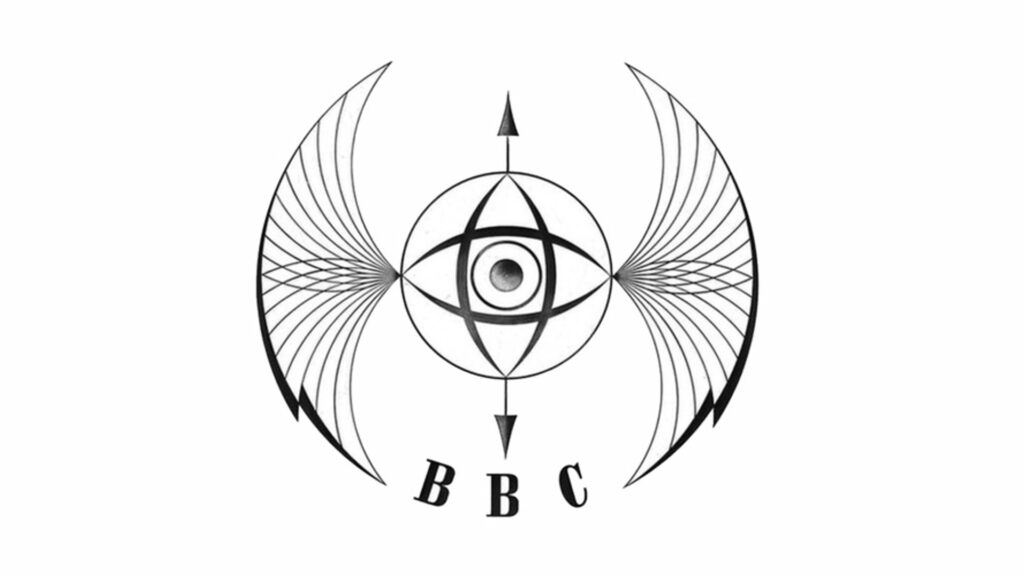
Of course, I had sort of been in TVC for years before that. Mentally I had been imagining myself making a chocolate sponge with Janet Ellis in the Blue Peter studio, playing with Goldie’s puppies on the Blue Peter lawn, dancing with Nik Kershaw in the Top of the Pops studio, being one of those million tap-dancers Roy Castle Bonnie Langforded with on Record Breakers or at least being on the phone to Sarah Greene shouting “left, left, splat” as Saturday Superstore foresaw the XBox generation with some then nifty graphical interactivity with Five Star’s latest album as a prize incentive.
The nearest we got to White City’s gleaming beacon of broadcasting was getting the engaged tone when trying to phone a question into The Boswell’s from Bread on Saturday Superstore. Actually, my eleven-year-old self did get on the BBC’s daily TV magazine show Open Air. I asked Julia Smith (EastEnders creator) whether it had been her favourite show to produce. She was as clearly disappointed in my soul-searching mode of enquiry as I was that Open Air was not actually broadcast from Television Centre, but – heaven forbid – Birmingham.
Television Centre always felt like a second home, a sort of televisual embassy bound by political neutrality and a creative haven for all lost souls and fans of Points of View. If something horrible should happen to my home or family, I imagined I could at least get on a train to London, find my way to Wood Lane and TVC would shelter me amidst Sue Cook’s blazers, Selina Scott’s knitwear and Simon Groom’s sheep. And if that didn’t work, I could at least phone up. I knew the number. 01 811 8055 was not just Going Live’s phone-in number and the Children in Need pledge line. It was the only phone number every kid in Britain knew – before of course it was cruelly re-cast as 0181 811 8181, 0207 811 8181 or heaven forbid 0845 Give Us Your Views Now.com.
TVC was as much a character in the BBC’s ouevre as Basil Fawlty, Del Boy, Gordon the Gopher, Claudius, Russell Harty, The Two Ronnies, the Doctor, and that odd couple with the matching anoraks from No Place Like Home (look it up). TVC denoted home from school and weekends. It was a babysitter you didn’t mind being stuck with. Saturday mornings were Sarah Greene and Mike Read frolicking about the forecourt of TVC all in the name of kids’ television. The Two Ronnies would dim the lights on a Sunday as Barbara Dickson would lean against a Studio One lampost to sing Another Suitcase in Another Hall. And on slow news days The Six O’Clock News would let some militant lesbians in so that Nicholas Witchell could sit on them and make the world just that bit safer for us impressionable kids as Blue Peter‘s Mark Curry traversed TVC’s corridors on an errant quadbike or penny farthing as crew members raced for cover.
Flash-forward a few years and I return to the BBC and TVC as “staff” with a BBC pass and everything. Working initially for BBC Comedy, I was able to experience all those BBC jokes and cliches, all those BBC canteen jibes and over-judicious concierges giving Basil Brush so much grief (though it was a thrill to drive through those hallowed gates, let alone be let through them).
However, what I encountered was still a thriving hub of production, a busy and industrious environment knuckling down and getting on with it – despite an evident “media course” mentality and vile sense of “accountability” kicking at the heels of content and production. But why does everyone of a certain generation want to work in “media”? Because Television Centre made us. It beckoned us in every day. It forever told us where it lived (“Wood Lane, W12 7RJ”). It took great pride to showcase its studios, dressing rooms, switchboards and broom cupboards. It was both a 1980s Oz and White City – with roads paved not with yellow bricks, but Blue Peter badges, Food and Drink recipe sheets, Points of View correspondence and Russell Grant’s knitwear patterns. But the TVC I experienced was also creaking round the edges. Parts of what Terry Wogan affectionately christened “The Concrete Doughnut” were falling apart. It was cheaper and easier for shows to rent out Pinewood Studios rather than nip downstairs. And just like the alleged Golden Age of British television of the 1960s and 1970s, perhaps TVC too was not meant to last. Cliché aside, it was impossible not to get lost. Or it was impossible for me to not get lost when trying to find BBC Comedy Room 3167 a (South Wing). And the Blue Peter garden was not actually that big nor possibly even a garden.
But you would also nip in a lift and help a newsreader balancing her toddler and scripts. You would see the enthusiastic queues of “the public” waiting in the rain to get into a recording of Never Mind The Buzzcocks or Last of the Summer Wine. You would see actors and presenters necking a latte with their make-up protectors still in place. You would clearly see the retro-cool 1970s fonted signage and BBC livery. You would hear news academics discussing the future of the Middle East in the gents. You would see panel show presenters perched on the stairs apologizing to the guests they were about to annihilate. It was what all of us imagined a television centre and the BBC to be.
TVC and the BBC were about coming home from school and knowing you were watching the same kids TV show from Studio Two that your mates were watching, rather than some syndicated 28-part cartoon on CBBC you can choose when you catch it. TVC and the BBC were the epitome of broadcasting to the nation – with the nation watching as an engaged mass. Strictly Come Dancing gets such solid ratings as it operates on the same notions of mass engagement – of knowing everyone is watching at exactly the same moment as you. As much as TVC forever showcased its corridors and studios, its output was not yet reduced to forever demanding we all WhatsApp our views, our opinions, our reactions. The “public” were not yet a tiresome co-star and cost-cutting alternative.
Yes, we had Nationwide and That’s Life carefully balancing decent content and human inanity. But now the dinner wallpaper that is The One Show will have a Tony Curtis or a Michael Caine on the sofa and have no qualms in interrupting tales of Marilyn Monroe in order to “roll some VT” on what The One Show thinks is the nation’s favourite litter tray. And if we are not being forever asked to Watch Again, the only corridors we now see are not in TVC but corporate and laminated ones full of wannabe gastro pub owners nervously awaiting Masterchef’s verdict on a duck breast their dying nan advised them to make. The streets of West London are no longer the haunts of The Good Life or Dennis Potter dramas, but Rogue Traders Caught On Camera Driving on a Duel Carriage-way Without an MOT.
As a viewer, it feels like prime-time slots which once dripped with sitcoms and fierce dramas now resemble the back-pages of Loot with an exhausting obsession with family trees, antiques and getting your plumbing done properly. TVC and the BBC used to make dramas about the Borgias, not transform tower block spare rooms into vestiges of Renaissance Italy for a fiver. Yet, sometimes folk who are looking for another heyday are overlooking exactly what is being broadcast right now. Would anyone even suggest the likes of Fleabag, Killing Eve, Ghosts, Call the Midwife, Sherlock, Line of Duty, Doctor Who, Horrible Histories, Normal People, I May Destroy You, Frozen Planet II, Glastonbury 2022 and the coverage ER II’s death and funeral examples of a corporation losing its touch?
In an age before branding became more important than content, the BBC was the first media monolith we knew. Whereas British telly may have once forgotten anyone north of Watford, great pockets of comedy, drama and factual television are now dotted throughout the land. The BBC Comedy of the 1970s may well have been called BBC Surbiton. But now we have BBC North, BBC Scotland and BBC Anywhere producing great funny fare. The BBC is about its programmes, not its buildings. The BBC has always been made up of a rich cast list of broadcasting edifices. Alexandra Palace, Lime Grove, Pebble Mill, Bush House, Maida Vale and Elstree Studios have all housed the corporation and new hubs will emerge and old ones will get switched off. But it is the shows that came from these media stables that is why the BBC is the world’s most recognized television corporation. Maybe TVC just represented a different era of audience engagement with television. It was more parochial. But so was the BBC. And so was Britain.
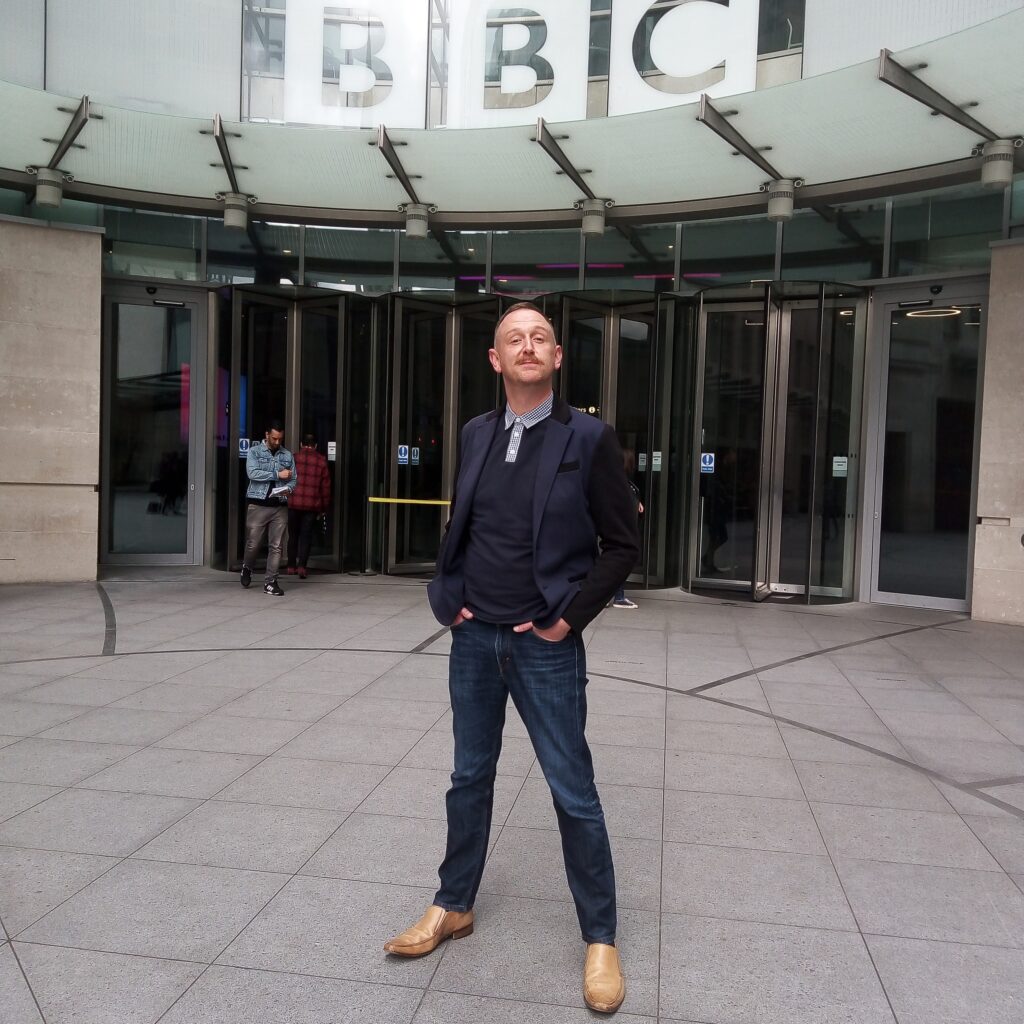
Cut to today and my pop-culture punditry, writing and commentary has bounced me around all the BBC’s 21st Century outlets. Technology enables us all to broadcast from our sofas as the BBC once did one hundred years ago. Like all things that are one hundred years old, it can trip and slip. It can repeat itself and still does not understand the pull of Game of Thrones or The Mandolorian. There is sometimes a sense it does not know why its rivals Netflix and Disney + work. Yet it has always had a very different funding pattern to navigate. It possibly does not always understand the streaming nature of consumption as it often tries to make the weekly episode work in a multi-platform age. And it has dropped all sense of arts coverage and film programming and documentary. It should make bolder claims and cultural observances to retain the licence fee and not let any government clip its already clipped wings under the cosplay of budget cuts and the cost-of-living crisis. When The Crown recreates vital beats of monarchic Britain’s history, it is often depictions of the BBC’s coverage of those events that help achieve that. It is hard to imagine any era in the future when the studio workings of Netflix or Hulu will be depicted in any drama.
Yet, it remains a vital service, destination and often family member for the whole of Britain. For a vast swathe of people across the globe, the BBC is Britain. When a monarch dies, it is the BBC that the land tunes into to see if it is real. When the pandemic world is locked into its own homes, it is the BBC that swiftly turns its stations into education platforms, mental health discussion zones, Zoom orchestras, poetry recitals and impromptu laptop dramas. When a politician or this week’s Prime Minister needs to look good, the town hall debate on the BBC is the one that matters. And a sporting final is sometimes not that important until the BBC is showing it live – cue the Women’s World Cup glories and a true moment of BBC engagement.
Question it. Enhance it. But never lose it. When the most inane-minded politicians want it dismantled to appease Murdoch’s flying monkeys, it is proof the BBC is still doing exactly what it should be doing.
Happy Birthday, Auntie Beeb.

